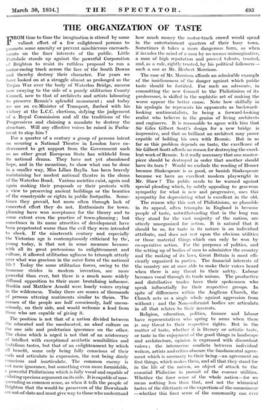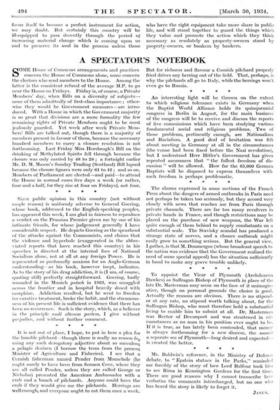THE ORGANIZATION OF TASTE
FROM time to time the imagination is stirred by some valiant effort of a few enlightened persons to promote some amenity or prevent mischievous encroach- ments on the finer interests of the public. Little Portslade stands up against the powerful Corporation of Brighton to resist its ruthless proposal to run a motor-racing track across the face of the South Downs and thereby destroy their character. For years we have looked on at a struggle almost as prolonged as the Trojan War over the body of Waterloo Bridge, success now swaying to the side of a purely utilitarian County Council, now to that of architects and artists labouring to preserve Rennie's splendid monument ; and today we see an ex-Minister of Transport, flushed with his victory at the L.C.C. elections, defying the judgement of a Royal Commission and all the traditions of the Progressives and claiming a mandate to destroy the structure. Will any effective voices be raised in Parlia- ment to stop him ?
For a quarter of a century a group of persons intent on securing a National Theatre in London have en- deavoured to get support from the Government such as no other great European State has withheld from its national drama. They have not yet abandoned hope, and in the meantime, to show what can be done in a smaller way, Miss Lilian Baylis has been bravely maintaining her modest national theatre in the slums of the Waterloo Road. Various societies exist, again and again making their proposals or their protests with a view to preserving ancient buildings or the beauties of the countryside or rights in public footpaths. Some- times they prevail, but more often through lack of concerted -effort they do not. Enthusiasts for town- planning have won acceptance for the theory and to some extent even the practice of town-planning ; but sometimes in its name atrocities of development have been perpetrated worse than the evil they were intended to check. If the nineteenth century and especially the Victorian age is contemptuously criticized by the, young today, is that not in some measure because with all its great pretensions to enlightenment and culture, it allowed utilitarian ugliness to triumph utterly over what was gracious in the outer form of the national life ? Today the same utilitarian forces, owing to the immense strides in modern invention, are more powerful than ever, but there is a much more widely diffused opposition to their more brutalizing influence. Ruskin and Matthew Arnold were lonely voices crying in the wilderness. Today there are scores of thousands of persons uttering sentiments similar to theirs. The masses of the people are half consciously, half uncon- sciously, on their side, and would welcome a lead from those who are capable of giving it.
The position is not that of a nation divided between the educated and the uneducated, an aloof culture on the one side and proletarian ignorance on the other. The claim which is urged is not that of an aristocracy of intellect with exceptional aesthetic sensibilities and fastidious tastes, but that of an enlightenment by which all benefit, some only being fully conscious of their ends and articulate in expression, the rest being dimly conscious and inarticulate. The common enemy is not mere ignorance, but something even more formidable, a powerful Philistinism which is fully vocal and capable of enlisting specious argument on its side. It is capable of mas- querading as common sense, as when it tells the people of Brighton that the would-be preservers of the Downloads are out-of-date and must give way to those who understand how much money the motor-track crowd would spend in the entertainment quarters of their busy town. Sometimes it takes a more dangerous form, as when it invades the mind of a man by no means unimaginative, a man of high reputation and proved talents, trusted, and, as a rule, rightly trusted, by his political followers— such a one as Mr. Herbert Morrison.
The case of Mr. Morrison affords an admirable example of the insidiousness of the dazger against which public taste should be fortified. For such an advocate, in committing the new Council to the Philistinism of its predecessor, is skilled in the sophistic art of making the worse appear the better cause. Note how skilfully in his apologia he represents his opponents as backward- looking sentimentalists, he being a forward-looking realist who believes in the genius of living architects and engineers. It is reasonable to agree with him that Sir Giles Gilbert Scott's design for a new bridge is impressive, and that so brilliant an architect may prove capable of holding his own with Rennie. But in so far as this problem depends on taste, the excellence of Sir Gilbert Scott affords no reason for destroying the excel- lent work of Rennie. Is it really necessary that one master- piece should be destroyed in order that another should have its turn ? Would we exclude the reading of Homer because Shakespeare is as good, or banish Shakespeare because we have an excellent modern playwright in Mr. Shaw ? The public needs to be warned against special pleading which, by subtly appealing to generous sympathy for what is new and progressive, uses this sympathy for depreciating what is excellent in the old.
The reason why this sort of Philistinism, so plausible in its appeal, often triumphs in England is because people of taste, notwithstanding that in the long run they stand for the vast majority of the nation, are utterly unorganized for action. It is natural that it should be so, for taste in its nature is an individual attribute, and does not rest upon the obvious utilities or those material things which can only be won by co-operative action. For the purposes of politics, and the setting up of bodies of men to administer the country and the making of its laws, Great Britain is most effi- ciently organized in parties. The financial interests of the country are at once able to make their voices heard when there is any threat to their safety. Labour becomes vocal through its trade unions. The productive and distributive trades have their spokesmen who speak influentially for their respective groups. In spite of differences within the Anglican Church, the Church acts as a single whole against aggression from without ; and the Nonconformist bodies arc articulate in all that relates to their interests.
Religion, education, politics, finance and labour have representatives who spring to arms when there is any threat to their respective rights. But in the matter of taste, whether it is literary or artistic taste, or taste in the enjoyment of the good things in landscape and architecture, opinion is expressed with discordant voices ; the internecine conflicts between individual writers, artists and critics obscure the fundamental agree- ment which is necessary to their being—an agreement on first things, which makes them, and all that they stand for in the life of the nation, an object of attack to the essential Philistine in pursuit of the coarser utilities. Whether the finer sense of the whole nation—for we mean nothing less than that, and not the whimsical tastes of the dilettante or the expertism of the connoisseur -p-whether this finer sense of the community can ever focus itself to become a perfect instrument for action, we may doubt. But certainly this country will be ill-equipped to pass decently through the period of increasing material change which is coming upon us and to preserve its soul in the process unless those who have the right equipment take more share in public life, and will stand together to guard the things which they value and promote the action which they think necessary as resolutely as property-owners stand by property-owners, or bankers by bankers.









































 Previous page
Previous page